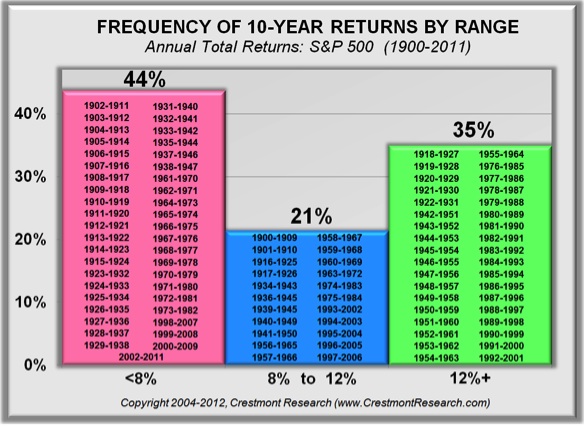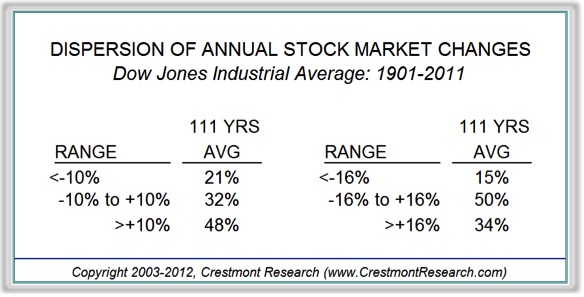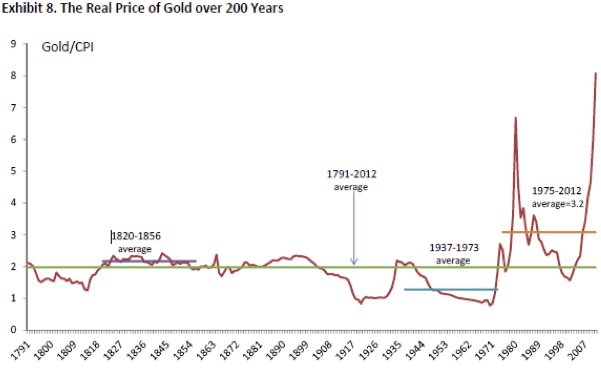"I have no child for whom I could wish to make a provision-no family to build in greatness upon my Country's ruins." --Washington
The S&P 500 was up 16% and hit a five-year high. The Dow was up 7.3%. Most money managers didn't do as well: 65% of large-cap managers underperformed the S&P 500 as did 80% of large-value investors; 67% of small-cap managers didn't beat the Russell 2000 index.
U.S. household debts peaked five years ago at an astonishing $13.8 trillion. Since then it has declined to $12.9 trillion. Loan write-offs, at $585 billion, account for 60% of that decline; in the last five years Americans have walked away from $3 in debt for every $2 they’ve paid off.
For the paranoid among us: Vermont Transportation Secretary Brian Searles said, “…..
calculating how much of a...(transportation).. tax is owed would be done through the global
positioning system devices that are expected to be standard equipment [capable
of tracking location, time] in cars later this decade.”
There are 1200 proposed new coal plants. China and India account for 76 percent of proposed capacity. Turkey and Russia also have big plans. And a growing number of coal plants are being proposed for developing countries such as Cambodia, Guatemala and Uzbekistan, nations that are looking to cut-rate sources of energy to fuel economic growth. Global demand for coal is expected to grow to 8.9 billion tons by 2016 from 7.9 billion tons this year. China is expected to add about 160 new coal-fired plants to the 620 operating now, within four years. During that period, India will add more than 46 plants. I wonder if the environmentalists will become active in these two, clearly dominant, countries contributing to fossil fuel use.
The Bundesbank has decided to move 300 tons of German gold from the Federal Reserve in New York back to Frankfurt. What could be the motive there, if any?
The DOE is setting up the Rare Earth Metals lab at the land grant University in Ames, Iowa, at Iowa State University. The former Govenor of Iowa, Tom Vilsack, is the current Secretary of Agriculture.
From the Seattle Times on grounding the Dreamliner: At Boeing, pushback on 787 grounding. "Gordon Bethune, the former Boeing executive who left to run Continental Airlines -- and who in that position bought the grounded Dreamliners now owned by United -- is emphatic that the government overreached. He criticized the decision to ground the plane, which was made by Secretary of Transportation Ray LaHood and FAA chief Michael Huerta. "Neither of those two guys know the front end from the back of an airplane," Bethune said. "They jumped the gun, but that's the product of a cover-your-ass administration," he fumed. "It's heavy-handed, draconian and way, way beyond what needs to be done to protect the public." "Obviously, (Boeing's leaders) are disappointed in this overreaction," Bethune said. "But it doesn't help them to bitch, so they will never say anything publicly that could be disparaging to the government.""Don't think they are making light of this," Bethune added. "I'm sure they are chagrined as hell. But they are going to fix it.""
Cessna was forced to replace lithium-ion batteries on its CJ4 business jet with nickel-cadmium after a battery fire on the plane in 2011.
Already at a record, the Cushing Storage hub in Oklahoma added another 1.8 million barrels to storage sending total Cushing stocks to 51.9 million barrels of oil in storage facilities at the energy hub.
There has been 6.3 million barrels of oil added to Cushing during the last 6 weeks. To put these numbers into perspective, Cushing oil inventories stood at 28.3 million barrels for this time a year ago.
There is more oil being produced than used. U.S. refineries are maxed out. This oil is going international. What are the Saudis to do?
Who was Solomon Shereshevsky?
Common Core is a federal program created to make the American educational system more competitive internationally. The mathematics plan is quite specific, grade to grade, and, as it is linked to federal grants, will probably become the norm for starter education programs. Stanford University professor James Milgram, the only mathematician on the validation panel, states that the Common Core math scheme would place American students two years behind their peers in other high-achieving countries. In protest, Milgram refused to sign off on the standards.
A recent study shows that life expectancy of white males and females has fallen in the U.S. by 3 and 5 years respectively in people without a high school diploma. The steepest declines were for white women without a high school diploma, who lost five years of life between 1990 and 2008, said S. Jay Olshansky, a public health professor at the University of Illinois at Chicago and the lead investigator on the study, published in Health Affairs. By 2008, life expectancy for black women without a high school diploma had surpassed that of white women of the same education level, the study found. This is third world stuff.
There is some evidence that those strange "savant" characters who remember weird or astonishing things or can do unexpected tasks may have a connection to left brain injury with right brain compensation or relief. Some are connected to childhood trauma which leaves a child impaired in some way but extraordinarily able in another. But there is one provocative study involving the notorious "nine-dots problem" where nine points must be connected together by a pencil line without lifting the pencil off the paper. 5% of the population can do this but, if you stimulate the left brain with a low electrical charge and depress it, 39% did it.
Sheen and Asner want to boycott--with awards as well--the film "Zero Dark Thirty." This is a very strange thing. Kathryn Bigelow's defense in an L.A. editorial is simple and obvious: Her defense is that depicting torture does not condone it. So what is the problem? Ugly and immoral violence? Quentin Torentino won a scriptwriting award! As torture is excessive in the minds of most civilized people it is hard to say if the scenes are excessive but the problem remains: What are the objectors objecting to? Not that it happened. Not that it was a component of the story. Not that we have "rendition" sites where we outsource torture we are not willing to do ourselves. Could it be that torture stains the achievement of the current administration in killing bin Ladin and that the entertainment industry, led by their most vociferous and outspoken representatives, will not tolerate that? Even if it means criticizing speech? The speech of their own art?
The National Climate Assessment states that temperatures in the USA are already up 1.5 degrees from the average temperature during 1900 to 1960. Sea levels are already up 8 inches since that time too. The length of the frost free season has grown by up to 21 days, This is a government group. The Intergovernmental Panel on Climate Change (IPCC)--another governmental group--estimates that the earth’s average temperature will increase somewhere between 1.1°C and 6.4°C over the 21st century. How much of the IPCC’s projected 1.1°C to 6.4°C of warming will the U.S. be responsible for in the next century? The answer is about 0.08°C of the low end estimate and about 0.35°C of the high end estimate. Using the IPCC’s mid-range scenario, carbon dioxide emissions from the U.S. contribute about 0.19°C of the total 2.96°C global temperature rise. So, are we going to get tough with the biggest environmental offender, China? That could be dangerous but do not worry; the people who are concerned about this warming are not just picking soft targets. They are willing to suffer anything for their beliefs. Right?
To make up for lost revenue, Washington state will be charging residents who own fuel-efficient vehicles an annual tax of $100. The state has decided that electric car owners need to "contribute their fair share to the upkeep of our roads," says Washington State Senator Mary Margaret Haugen who sponsored the bill.
14% of Mercury in Great Lakes Comes from China
The U.S. will surpass Russia and Saudi Arabia this year to become the largest producer of liquid fuels, BP Plc said. Liquids output, which includes oil, natural gas liquids and bio-fuels, will be boosted in the U.S. by tight oil extracted by the same technology that sparked a boom in shale gas. The IEA said the U.S. will become the world's biggest oil producer for about five years starting in 2020.
The "fiscal cliff" legislation sends about 165 million dollars to railways. And short line and regional railroads are allowed to claim a tax credit for 50 percent of the cost of infrastructure improvements, up to $3,500 per mile. Wow, Buffett really got lucky there.
New coal capacity built in 2012 rose 135%, jumping from 1,932 megawatts in 2011 to 4,510 in 2012. While existing coal plants lost market share in 2012, coal had a relatively good year in the new generation market and accounted for about 17% of all new power plant capacity built in the USA last year. Their capacity is up and they are losing market share.
The former chief of the U.S. Anti-Doping Agency says a representative of Lance Armstrong's offered the agency a donation in the range of $200,000 to $250,000 in 2004. Armstrong denies it. Hypocrisy or lying? Does it really matter? If the government wanted to create something the nation really needs it should be a Bureau of Heroes.
AAAAANNNNNNDDDddddddd.......a chart:







